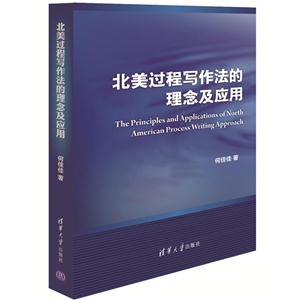北美过程写作法的理念与应用
本书特色
[
本书是关于北美写作理念在中国大学本科生英语写作课中的应用研究。本书以中国北京某
高校大学三年级学生为研究对象,对学生进行了一系列以北美“支架式”过程写作教学法为主
导的写作讲座和辅导。通过质性研究方法和大量的课堂观察,本书考察了学生英语写作的现状
和面临的困难,并提出相应的应对策略。研究表明,“支架式”过程写作法的有效实施能够帮
助学生增强英语写作信心,挖掘英语写作潜力,逐步提高自主写作能力。
本书为广大英语写作课教师提供了写作教学方法方面的指导,具有较强的实践意义;也为
英语写作研究者提供了一手的实证案例和数据,对大学英语写作教学研究有一定的借鉴意义。
]
内容简介
[
本书是关于写作课程教学的实证研究,通过运用北美写作理念,引导学生进行一系列的写作练习和改进,让学生找到自己的写作困难,并相应提高。本书适合教授英语写作课程的老师,也适合想通过系统的写作方法提高写作水平的学生使用。
]
目录
Chapter 1 Introduction to an EFL Writing Workshopand Its Research Context 11.1 Theoretical Background of the Study 21.2 Statement of the Phenomenon 41.3 Current Educational Context of the Study 10Chapter 2 North American ESL Writing Theories andEnglish Writing Instruction in China 152.1 Overview of ESL Writing Research 152.2 Approaches to L2 Writing Pedagogy: An Overview ofCurrent Trends 172.2.1 Focus on Form and Current-Traditional Rhetoric, 1966– 172.2.2 Focus on the Writer: Expressionism andCognitivism, 1976– 182.2.3 Focus on Disciplinary Content and DiscursivePractices, 1986– 212.2.4 Focus on Readers and Discursive Communities: SocialConstructionism, 1986– 222.2.5 Focus on Sociopolitical Issues and CriticalPedagogy, 1990– 232.3 The Context of Education in China 262.3.1 Historical Background 262.3.2 The Goal of Education 272.3.3 The Role of the Teacher 282.3.4 Classroom Participation 282.3.5 Cultural Framework 29VI The Principles and Applications of North American Process Writing Approach2.4 Current English Writing Instruction and ClassroomPractice in China 302.4.1 Overview of English Writing Instruction 302.4.2 English Writing Teaching and Research in China 332.5 North American Process Writing Approach Frameworkin an EFL Setting 342.5.1 Characteristics of the L2 Writer 352.5.2 L1 Reader—Audience of the L2 Text 362.5.3 L2 Text—Genre and Discourse Communities 372.5.4 Contexts for L2 Writing—Cultural, Social, andSituational Aspects of Writing 402.5.5 Interaction in an Authentic EFL Setting 412.6 Building Adequate Writing Competence Among EFLUniversity Students 422.6.1 Components of Writing Proficiency 422.6.2 Factors Affecting ESL/EFL Writing Development 422.7 Summary 43Chapter 3 A Process Writing Workshop Conducted at aChinese University 453.1 The Qualitative Nature of the Study 453.2 Overview of the Study 473.2.1 Research Setting 493.2.2 Participants 523.3 Design of the Writing Workshop 583.3.1 Theoretical Basis of the Writing Workshop 583.3.2 Goals and Objectives of the Writing Workshop 583.3.3 Writing Workshop Description 593.4 Three Sets of Empirical Data 603.4.1 Process Data 62Contents VII3.4.2 Product Data 633.4.3 Perception Data 633.5 The Analysis of Three Sets of Data 673.5.1 Process Data 683.5.2 Product Data 693.5.3 Perception Data 693.6 The Trustworthiness of the Study 713.6.1 Credibility 713.6.2 Transferability 723.6.3 Dependability 733.6.4 Confirmability 733.7 Summary 74Chapter 4 Chinese Writing Teachers’ Classroom Practiceand Perceptions of Process Writing Approach 754.1 Problems and Concerns in EFL Student English Writing 754.2 EFL Teachers’ Writing Class Practice 784.2.1 Gao’s Writing Class 794.2.2 Chen’s Writing Class 804.2.3 Wang’s Writing Class 814.2.4 Lin’s Writing Class 834.3 EFL Teachers’ Perceptions of North American ProcessWriting Activities 844.3.1 Gao’s Perception 844.3.2 Chen’s Perception 854.3.3 Wang’s Perception 864.3.4 Lin’s Perception 87VIII The Principles and Applications of North American Process Writing ApproachChapter 5 Students’ Experiences, Attitudes andAchievements from the Process WritingWorkshop 915.1 Students’ Previous Writing Experiences and Attitudes 915.1.1 Previous Writing Experiences 925.1.2 Previous Writing Attitudes 935.2 Students’ Workshop Writing Experiences and Attitudes 945.2.1 Most Liked Workshop Activities and Students’Attitudes 955.2.2 Least Liked Workshop Activities and Students’Attitudes 1005.2.3 Attitudes Toward Specific Writing Strategies 1025.3 Students’ Written Evaluations of Workshop Sessions 1115.3.1 Strategies to Get Started 1125.3.2 Raising Awareness About Writing 1135.3.3 Taking Charge of Their Own Learning in the WritingProcess 1135.3.4 Learning Specific Strategies and Applying toOwn Writing 1155.4 Students’ Writing Samples in the Workshop 1195.4.1 On the Textual Transitions 1215.4.2 On Providing Details to Improve Clarity andReinforce Arguments 1225.4.3 On Providing Vivid Descriptions 1245.4.4 On Providing Supporting Evidence to GeneralAssertions 1265.4.5 Revision of Opening Paragraph 129Contents IX5.5 Main Achievements from the Writing Workshop 130Chapter 6 Discussion and Interpretation of the ProcessWriting Workshop 1336.1 Overall Discussion and Interpretation 1366.1.1 The Concept of Writing and Learning to Write 1366.1.2 Overcoming Writing Apprehension and ApplyingWriting Strategies 1386.1.3 The Recursive Writing Process in the Workshop 1396.2 Conflict and Convergence Between Traditional ChineseLearning and Western Style Learning 1416.2.1 The Fundamental Principles Behind Chineseand American Composition 1416.2.2 Conflicts Between Chinese Educational Traditionsand Western Pedagogy 1466.3 Adapting and Tailoring Writing Courses for EFL Students 1526.3.1 Building Adequate Writing Proficiency 1526.3.2 Interactions Among Four Components of WritingProficiency 153Chapter 7 The Implications of Teaching English Writingin Chinese Universities 1577.1 Conclusions 1577.2 Implications for Current EFL Writing Practice 1587.2.1 Adjusting Students’ Attitudes Toward EnglishWriting 1597.2.2 Providing Support for Writing CompetenceDevelopment 1607.2.3 Considering Realistic Teaching Context 1617.2.4 Making Cultural Adaptations 162X The Principles and Applications of North American Process Writing Approach7.3 Future Research in EFL Wirting in China 1647.3.1 Individualized Learning and CollaborativeLearning 1647.3.2 Hyper-textual Learning 1657.4 Concluding Remark 167References 169Appendix 179List of TablesTable 1: Demographic Information of Student Participants 53Table 2: Demographic Information of EFL Teacher Participants 56Table 3: Previous Attitudes Toward Writing in English 93Table 4: Summary of Workshop Writing Strategies and StudentPerceptions 102信息
封面

书名:北美过程写作法的理念与应用
作者:何佳佳
页数:191
定价:¥68.0
出版社:清华大学出版社
出版日期:2016-08-01
ISBN:9787302449331
PDF电子书大小:158MB 高清扫描完整版
